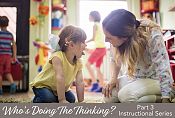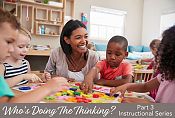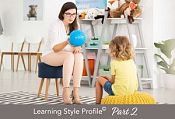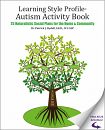How To Support Speech Pathologists And Children With Autism To Reduce Potential Behavior Challenges: Strategies To Design Successful Therapy Sessions – LSP Part III Instructional Series #e255
Presenter: Patrick Rydell, Ed.D., CCC-SLP
Learn therapy design considerations to help mitigate interactional breakdowns during therapy sessions.
This course is part of the Learning Style Profile© Training Series. The below 2 courses are suggested prerequisites prior to taking this course.
More time spent coping. . . is less time spent learning. Both children with ASD and SLPs struggle at times with interactional breakdowns during speech therapy sessions. Core challenges and learning style differences in children with ASD often lead to mutual confusion, anxiety, and misunderstanding. . . resulting in potential “behavior challenges”. SLPs then spend an inordinate amount of time and energy getting the session back to a calm, regulated state. But, then therapy time is up.
This course provides SLPs with therapy design considerations to help mitigate interactional breakdowns so speech therapy can be more productive from the start. Through connecting empirical research and our understanding of ASD learning style challenges to the day-to-day therapy sessions, Dr. Rydell provides considerations and practical strategies for SLPs to design, set up and begin quality speech therapy sessions for children with ASD.
Offered for 0.15 ASHA CEUs – 1.5 Contact Hours.Course Overview – Run Time: 1:39:25
- Description of learning style challenges in children with ASD.
- Description of how learning style challenges in children with ASD can increase confusing coping behaviors in speech therapy.
- Description of learning style assessment questions that SLPs might consider when designing speech therapy sessions.
- Description of design considerations for SLPs to use to mitigate potential social breakdowns in speech therapy sessions.
- Description of how the Learning Style Profile© (LSP) design considerations may be used in conjunction with outcomes from a more individualized and comprehensive social, communication and behavior assessment.
– A.S., prior course participant
Read more comments about this course!
– M.F., prior course participant
Read more comments about this course!
This presentation will focus exclusively on the Learning Style Profile© (LSP). Other treatment approaches will receive limited or no coverage as part of this training. Presenter financial and non-financial disclosures may be found in the Presenter & Disclosures area.
Terms of Use: This course reflects the ideas and opinions of Patrick Rydell and is meant for educational purposes only. The content of this course is not meant to diagnose or treat any particular disorder nor meant to provide health, medical, or professional consultation. Patrick Rydell and Northern Speech Services are not responsible for risk, loss, or liability as a direct or indirect consequence related to information found in this course. Your enrollment in this course implies your agreement to and understanding of these terms.
Video PowerPoint presentation with author narration & downloadable handout. Stop and re-start the course at any point. Learners retain access to course content after completion for ongoing reference and review.
Reviews
"Use of peers in high school was the best discussion. I liked the clear descriptions of actions." A.K. (Jun. 2025)
"All good." M.V. (May 2025)
"All of it was beneficial. I liked that the course was very down to earth." J.C. (Apr. 2025)
"I found it helpful to think about how I am making the expectations known to the student at the start of the session through the setup of activities, schedules, timers, and other tools. The presenter was very clear and direct, and the bullet points were helpful." K.S. (Feb. 2025)
"I liked the ideas on how to better plan for treatment sessions." K.A. (Jan. 2025)
"The importance of designing sessions proactively to mitigate challenges a child presents with was helpful to discuss. Systematic, well-organized course." L.C. (Dec. 2024)
"Overall setting up expectations for a successful session was a beneficial topic. The presenter obviously has experience with treating children with ASD." K.G. (Oct. 2024)
"Working with object-oriented students was a helpful topic. I liked that the structure was clear." G.F. (Oct. 2024)
"Transitions and shared control were beneficial to discuss." C.M. (Oct. 2024)
"Good reminders about how to engage and gently increase challenges for greatest success and less behavioral responses when working in sessions with students with ASD." J.S. (Oct. 2024)
"The presenter was able to discuss strategies that could be implemented today in therapy sessions. The presenter was very knowledgeable about the content." M.H. (Aug. 2024)
"The process of having the child start by following the model to becoming the model in an activity was beneficial. I liked the practical examples and suggestions recommended in this course." H.W. (Aug. 2024)
"The presenter really focuses on the actual challenges that happen often in therapy. Very practical and neurodiverse affirming. Very clear." M.F. (Aug. 2024)
"I found the course helped to increase my cognitive flexibility about how I design sessions and build in variability and flexibility, distal learning for kids with ASD. It was organized in a manner that was easily absorbed and built on skills related to the LSP." B.D. (Aug. 2024)
"I felt the material was informative." F.G. (Jun. 2024)
"I think the most helpful thing that I learned was slightly changing different aspects of therapy (time, place, etc.) so the child doesn't get so stuck on a specific routine. This really gave me a different perspective on how to structure therapy for children with autism." C.B. (Jun. 2024)
"I appreciate the preparation of a game plan from the SLP to foresee what some potential conflicts might be for children with ASD. It is especially helpful to be reminded of the reduction of speech bombardment and providing visual information, peer modeling, and time to alert the child as a way of aiding the child in understanding transitions. I appreciate the understanding that we are helping the child with reducing their anxiety in how we teach considering questions that will reduce what is unknown to the child." S.B. (May. 2024)
"Strategies used for ASD were beneficial. I liked the different techniques that can be useful for therapy." J.G. (Apr. 2024)
"How to design a therapy session given the 10 LSP areas was helpful. The structure was easy to follow and very applicable." P.Z. (Apr. 2024)
"Designing sessions was beneficial to discuss." S.M. (Dec. 2023)
"Relevant presentation of information in an easy-to-follow format. The discussion concerning various design strategies was helpful." E.N. (Dec. 2023)
"Material presented was very functional. The suggestion on echolalia was very useful to me." H.K. (Nov. 2023)
"I liked the link between problem-solution. Good examples to clarify the strategies." R.M. (Nov. 2023)
"The suggestions for interaction using Coach Rotations and peers as mentors/wingmen were helpful. I liked that this course talked about learning style challenges that we have experienced and gives great direction on how to address these challenges." C.L. (Oct. 2023)
"I appreciated the initial concept of interacting with object-oriented children and starting with modeling the activity before giving the child objects to interact with." N.B. (Apr. 2023)
"Information about the LSP was beneficial. I liked that the presenter had himself on the video. It is much easier to listen to an online class when you can see the instructor." J.E. (Apr. 2023)
"The entire course was full of useful information." M.K. (Feb. 2023)
"The concepts of shared control design were very helpful. As a clinical fellow, I have not heard of this method, and I think it would be useful to integrate into my practice. I like the self-paced, complexity of the material and the "food for thought" questions provided afterward." M.R. (Jan. 2023)
"The speaker is very knowledgeable! Excellent class!" A.G. (Dec. 2022)
"I liked the notion of relinquishing control and sharing. The information on how to better use peers in the therapy setting was beneficial." J.R. (Nov. 2022)
"I learned how to arrange the room - making it less cluttered and more structured for the session." B.H. (Sept. 2022)
"I would recommend this course." E.R. (Aug. 2022)
"The pointers/ideas for designing therapy such as have peers be wingman and using mentors/peers nonverbally is good." T.E. (July 2022)
"I liked that the course explained specific challenges of students with ASD, and then gave useful ways to implement therapy to avoid behaviors before they even start. The information in this course was very useful and directly relates to my students. I look forward to using the suggested design considerations when working with my students with ASD." M.M. (June 2022)
"Good use of examples. Learning the importance of having a game plan to build into the therapy session to avoid pitfalls." J.T. (June 2022)
"The examples of how to design therapy based on certain ASD challenges was very beneficial to me. I am currently a preschool special education teacher, so I look forward to using some of these examples of design with my students who I know present these challenges, including using peer models, the pivot-grammar approach, staying away from scripted/verbal repetition, and avoiding presenting objects to an object-oriented child at the start of therapy or teaching." M.M. (June 2022)
"Dr. Rydell gives such an organized talk. He gives great examples for the therapy setting. It is well thought out and organized so we can all follow the format and understand where he's going." K.S. (May 2022)
"I liked the therapy applications – easy to understand and broke down important aspects of treatment." L.F. (May 2022)
"I liked the availability of the slides and the information presented in both formats was good." L.N. (Apr. 2022)
"I found the information about transitions and "coach rotation" to be the most beneficial for my daily practice. I liked how the online course was easy to follow along in the sense that each section was similar formatting and many examples were provided." S.S. (Apr. 2022)
"I liked the generative language for gestalt learners – the overall organization of the course." J.T. (Apr. 2022)
"I liked the 5 questions or TEACCH approach, and the strategies that would be helpful for each specific behavior." E.D. (Apr. 2022)
"Gained specific strategies on how to target challenges associated with ASD – assisting children with transitions." S.H. (Apr. 2022)
"I liked how down-to-earth and practical the presenter was with his examples. Course content was applicable to my therapy situations." C.F. (Feb. 2022)
"Useful ideas to use in my therapy". T.J. (Feb. 2022)
"I thought the Shared Control piece was especially helpful, and overall, all aspects of Dr. Rydell's presentation were very beneficial to my therapy design. Dr. Rydell was quite easy to follow. His course was very organized." L.K. (Feb. 2022)
"I liked the concept of peer modeling and its benefit to eliciting behavioral participation. The design recommendations and how they could apply to specific behaviors was helpful." C.E. (Feb. 2022)
“The presenter was very thorough with his explanations of the challenging behaviors encountered and the designs that may be used to reduce these behaviors when planning for therapy sessions.” H.T. (Feb. 2022)
“I found the use of visual and peer models vs. over talking through a situation to be something to consider to decrease demands on the already overloaded child. I like the situations presented and the suggestions made.” H.S. (Jan. 2022)
"Different ways of thinking about working with kiddos who have ASD - definitely going to try some of these strategies!" B.G. (Jan. 2022)
"All of the information shared will be beneficial to my daily practice with students with ASD. Very practical and realistic." A.S. (Jan. 2022)
Course Objectives
- Describe 10 LSP assessment questions that SLPs might consider when designing speech therapy sessions for children with ASD.
- Describe 10 learning style challenges that SLPs might consider when designing speech therapy sessions for children with ASD.
- Describe 10 considerations that SLP may use to design, set up and begin speech therapy sessions.
Presenter & Disclosures
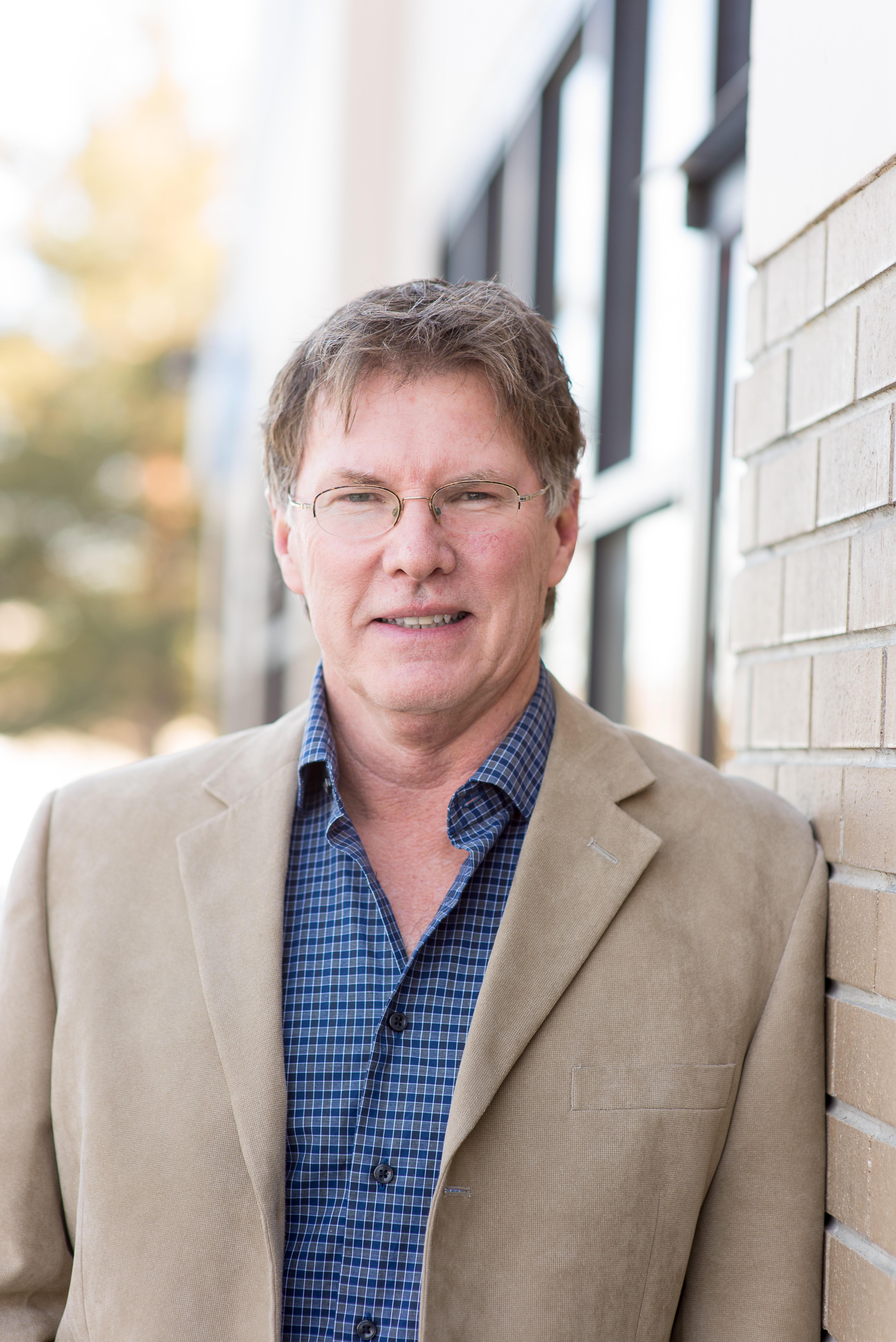
Patrick J. Rydell, Ed.D., CCC-SLP, is the Founder and Director of the Rocky Mountain Autism Center, Inc. and Autism On Call, LLC, in Lone Tree, Colorado. With more than 38 years of practice (“on the floor”) in the field of Autism Spectrum Disorder (ASD), he has provided international and national trainings, workshops, consultations and program development to governmental agencies, medical facilities, universities, school districts, professionals and families. His doctorate was earned through a National Institute of Health Leadership in Autism grant (1989) and he has a double master’s degree in speech pathology and special education with a program emphasis in early childhood and autism spectrum disorder. Dr. Rydell is a U.S. Fulbright Senior Specialist Grant recipient (2005). Dr. Rydell is the co-author of the SCERTS Model (Prizant, Wetherby, Rubin, Laurent & Rydell, 2006) and author of the Learning Style Profile for Children with Autism Spectrum Disorder (Rydell, 2012) and Autism On Call Educational Series (Vimeo, 2017). Dr. Rydell has also co-authored 5 book chapters and numerous peer-reviewed research articles on topics related to autism spectrum disorders. He is currently developing ASD programs across Asia, Central Asia, and South America based on the LSP approach.
Speaker Disclosures:
Financial — Patrick Rydell is a presenter of online CE courses sponsored by Northern Speech Services; receives royalty payments.
Financial — Patrick Rydell is the author of Learning Style Profile Autism Activity Book; receives royalty payments.
Financial — Patrick Rydell is the author of Learning Style Profile for Children with Autism Spectrum Disorder, published by Rocky Mountain Autism Center (January 21, 2013); receives royalty payments.
Nonfinancial — Patrick Rydell has no relevant nonfinancial relationships to disclosure.
Intended Audience / Accreditation

This program is offered for 0.15 ASHA CEUs (Intermediate Level; Professional Area).

Intended Audience
- Speech-Language Pathologists
ASHA CEUs:
Northern Speech online courses are registered with ASHA and are offered for ASHA CEUs. The number of ASHA CEUs is noted above. Note that 0.1 ASHA CEU = 1 contact hour = equals 1 CEE.
Earning ASHA CEUs and the ASHA CE Registry:
To earn CEUs from this course and have ASHA CEUs submitted to the ASHA CE Registry, course participants must satisfy each of these requirements:
- Participants must meet the eligibility requirements to earn ASHA CEUs (see below).
- Participants must indicate – prior to course completion – their intent for Northern Speech to submit this course to ASHA.
- Participants must complete/view this course in its entirety.
- Participants must complete the course post test with a minimum of 80% accuracy.
- After successful completion of the post test and completion of the course evaluation, a certificate of course completion is presented to the participant electronically via PDF.
- For those participants who indicated their intent for the ASHA CE Registry, course completion status will be submitted by Northern Speech to ASHA within 45 days of the course completion date.
Eligibility To Earn ASHA CEUs:
Attendees must meet at least one of the following conditions in order to be eligible to earn ASHA CEUs:
- Current ASHA Member.
- ASHA Certificate of Clinical Competence (CCC) Holder.
- Licensed by a state or provincial regulatory agency to practice speech-language pathology (SLP) or audiology.
- Credentialed by a state regulatory agency to practice SLP or audiology.
- Credentialed by a national regulatory agency to practice SLP or audiology.
- Engaged in a Clinical Fellowship under the supervision of an individual with their ASHA CCC.
- Currently enrolled in a master's or doctoral program in SLP or audiology.
If an attendee is not an ASHA member or CCC holder but meets any of the above criteria, they may inform the ASHA CE Registry of their eligibility by visiting this site.
ASHA CE Registry:
During the enrollment process, if you select to receive ASHA credit for this course and if you provide your ASHA number, Northern Speech will automatically submit your CEU information to the ASHA CE Registry after successful course completion (80% on post test). This submission happens once per month, during the first week of the month. For example, if you complete your course on November 7th, Northern Speech will submit all November online course CEUs to ASHA during the first week of December. When ASHA inputs the information into their database, they will mark the course as completed on the last day of the month in which it was completed, so November 30th using this example. The certificate of completion available for you to print immediately, however, will reflect the actual completion date, November 7th in this example. Due to ASHA processing procedures please allow 2-3 weeks, from the submission date, for the course to appear on your ASHA transcript.
Licensing Boards: Most state licensing boards DO accept CEUs earned online (usually classified as home-study credits). Some state boards do, however, place a limit to the number of credits that can be earned via home study/online courses. For the most current information, we suggest that you contact your licensing board or agency to verify acceptance policies and/or any credit limits related to home-study courses prior to registering for this course.
Additional accrediting agencies by which Northern Speech is an approved CE provider:
- California: NSS is approved as a provider of continuing education by the California Speech-Language Pathology & Audiology Board. Provider #PDP4. Online CEU limits may apply; please contact SLPAHADB for current online CEU acceptance policies.
- Iowa: NSS is approved as a provider of continuing education by the Iowa Board of Speech Pathology and Audiology Examiners. Provider #169.
- Kansas: NSS is approved as a provider of continuing education by the Kansas Department of Health and Environment. Provider #LTS-S0005.
- Florida: NSS is approved as a provider of continuing education by the Florida Speech-Language Pathology and Audiology Board. Provider #SPA-026.
- New Jersey: NSS is approved as a provider of continuing education by the New Jersey Department of Education. Provider #1654.
Frequently Asked Questions
Customer Support: Please phone 888.337.3866 or email info@northernspeech.com.
Course Completion Timeframe:
You have unlimited time to complete our online courses. You may log off and log on as often as you’d like to in order to complete all sections of a course.
However, completion dates are based on Eastern Standard Time. Therefore, if you need your CEUs by a certain date, be sure to complete the course test before 11:59pm EST on that date. For example, if you need CEUs before January 1st, you will need to complete the course test before 11:59pm EST on December 31st.
Content Access:
Access to course materials and content does not expire, even after completing the post test. You may continue to review course material by logging into your NSS account, clicking the My Online Courses tab, and then viewing your desired course.
Certificate of Completion:
On successful completion of the post test (80%), a certificate will be immediately available for download and/or printing. This certificate will include your name, date of completion (based on Eastern Time Zone, USA/Canada), and number of contact hours (CEUs / CEEs). Please note that CEUs are awarded on the date of successful test completion, not the date of course enrollment. Please ensure that you successfully complete the post test prior to any licensure renewal dates.
ASHA CE Registry Submission:
During the enrollment process, if you select to receive ASHA credit for this course and if you provide your ASHA number, NSS will automatically submit your CEU information to the ASHA CE Registry after successful course completion (80% on post test). This submission happens once per month, during the first week of the month. For example, if you complete your course on November 7th, NSS will submit all November online course CEUs to ASHA during the first week of December. When ASHA inputs the information into their database, they will mark the course as completed on the last day of the month in which it was completed, so November 30th using this example. The certificate of completion available for you to print immediately, however, will reflect the actual completion date, November 7th in this example. Due to ASHA processing procedures please allow 2-3 weeks, from the submission date, for the course to appear on your ASHA transcript.
Purchase Orders:
Purchase orders are currently not accepted for online orders, if you wish to submit a purchase order please do so at info@northernspeech.com or fax to 888-696-9655.
What is an Online Course?
Our Online Courses consist of video, audio, and/or text content and are offered for ASHA CEUs. Unlike a webinar, which requires participants to be logged on and at a computer at specific times, our Online Courses are available to you at any time, from any device, via your NorthernSpeech.com online account. You may work at your own pace and start and stop your course as you wish. Your course will conclude with a short post test. On successful completion of the post test (>80%), a printable certificate of completion is presented to you.
Receiving CEUs:
Northern Speech is an ASHA CE Provider and our online courses are registered with ASHA and offered for ASHA CEUs. Please note that successful completion of the online post test is required prior to the awarding of CEUs. Please contact your state licensing board for acceptance policies related to CEUs earned online. Please note that courses offered for university students are not applicable for CEUs.
Registering for an online course:
You may browse all online courses by clicking the Continuing Education tab above, then Online Courses. Once you find a course, click Enroll Now, and you will be asked to either log into your existing Northern Speech account or create a new online account. Once you’ve entered your account information and provided your credit card payment, your course will be immediately available to you.
Accessing your purchased course or returning to a purchased course:
You will be able to access your online course by logging into your Northern Speech account and then clicking the My Online Courses tab on your profile screen. Click the course you would like to start or to resume. From there, proceed through the course sections until you are ready to complete the post test. You do not have to complete your course all at once. You may log on and off as you wish.
Testing requirements:
Each online course concludes with a post test consisting of multiple choice or true & false questions. Scores of 80% or greater are required for successful course completion and awarding of CEUs. You may revisit course materials and retest as needed to achieve a passing score.
Number of CEUs offered:
We offer courses from 1 to 21 contact hours. Each course will note the number of CEUs offered. Please note that 0.1 CEU = 1 contact hour = 1 CEE.
State licensing boards and online CEUs:
NSS is an ASHA CE Provider and most state licensing boards DO accept ASHA CEUs earned online (usually classified as home-study credits). Some boards do, however, place a limit to the number of CEUs that can be earned via home study/online courses. For the most current information, we suggest that you contact your licensing board or agency to verify acceptance policies and/or any CEU limits related to home-study courses prior to enrolling in an online course.
Course formats:
Our course formats include: text, audio, video, and PowerPoint with author narration. Each course will note the format on the course description page. Most courses include closed captioning.
Course handouts:
Most of our online courses provide a link to download the accompanying handout as a PDF file.
Group discounts:
Groups of 3 or more are eligible for a 20% discount on each registration on most of our online courses. To receive this discount, registrations need to be processed together via the "Group Rates" tab on the Online Course of your choice.
Computer requirements:
For our online courses to function best, we recommend that you update your computer to include the newest version of your Internet browser (Safari, Chrome, Firefox, Edge, Internet Explorer, etc.) and newest version of your computer's operating system. Also a high-speed Internet connection is recommended (cable or DSL). Speakers or headphones will be required for many of our courses as many contain audio components.
Course Cancellation Policy:
A purchased online course can be exchanged, refunded, or transferred to another individual if contact is made with NSS (via phone or email) within 30 days of purchase and the course materials have not been viewed or downloaded.
Special Needs:
Please click here for any special needs requests, and we will do our best to accommodate them.
| Contact Us |




